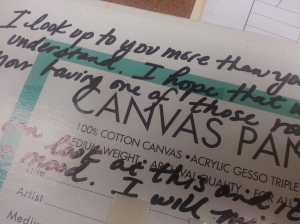 I never meant to be a teacher.
I never meant to be a teacher.
Fifteen years ago, I sat in an interview with the head of the English Department of a large public high school in an elite suburban district south of Boston for a job I knew I wouldn’t secure. At the end of our meeting, she said that she felt I was a “natural teacher,” but that she couldn’t hire me because I hadn’t had any formal training. She was right. I had worked as a Starbucks barista. My undergraduate degree was in Creative Writing. What did I know about teaching?
It’s been more than thirteen years since someone hired me to stand in front of a classroom of students and act like a teacher. I’m still learning.
In August, I started over. After seven years at the same school, I left, only to become “the new teacher” again. I gave up the comfort and stability of teaching the third and fourth sibling in a single family, or sometimes even the same students three years in a row. My campus of 200 became one of 2,000. I’m no longer in Room 24, I’m in room 0-9-1-0-something. And, unless it’s to the cafeteria, the media center, or the office, I rarely have any idea where I’m going.
But something recognizable arrived with the students.
After the first day, their faces were familiar. I felt like I knew them, but didn’t know why. I watched as they interacted with each other and with me and suddenly I understood: they were showing me tiny parts and pieces of the past.
Jared’s voice reminds me of Chandler. Alex is so similar to my other Alex (but not quite as tall). Riley’s running makes me miss Emily. I almost call Amanda “Grace” almost every day. When Nevada reads Horatio’s lines in his not-exactly-Scottish accent, I remember Adam battling Myra at the end of Macbeth. (It was an epic cardboard-sword duel that started inside the classroom, then went outside, then came back in.)
That’s not to say that my students are not individuals, or that I see them as the same. That’s not it at all. But it is to say that many of my new students connect me, through some barely noticeable and unintentional attribute, to former ones from two or ten or thirteen years ago. There’s a kind of comfort that I find in that, and I’m grateful for it.
Dr. James Comer said it, and every teacher has heard it (most likely in one of those new-teacher trainings like the one I attended this summer): “No significant learning occurs without a significant relationship based on mutual respect.” I scribbled some version of it down in the margin on one of the pages of my how-to-be-a-good-teacher manual. But what I’ve learned so far is that it’s absolutely true.
I don’t know if I’ll ever have the “good teacher” thing down. And I don’t know what a “natural teacher” is. But I know where I fall short and I know where I suffice. And sometimes, I’m surprised by the things they learn, the things I didn’t know that I was teaching. This past week, a former student of mine, who was in the midst of a devastating tragedy, found a way and a reason to tell me what I taught her.
I haven’t yet found the student who reminds me of her, but I’ll keep looking.
Because what she taught me, what I learned from her, is that maybe, after thirteen years, I’m starting to understand what it takes to make a significant relationship — something that’s bigger than formal training, and can’t be measured in numbers or percentages. And yet, it’s the most significant part.


